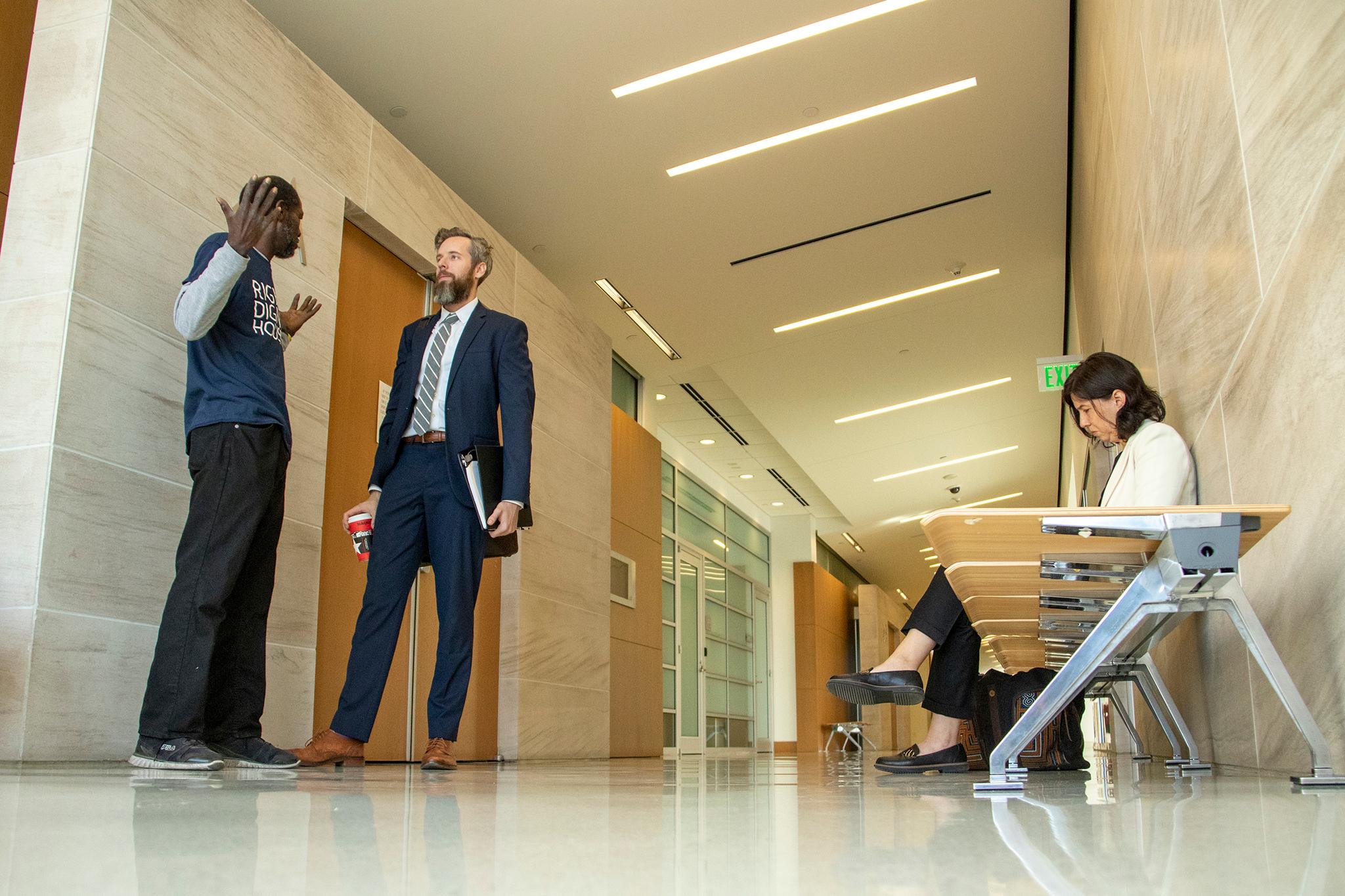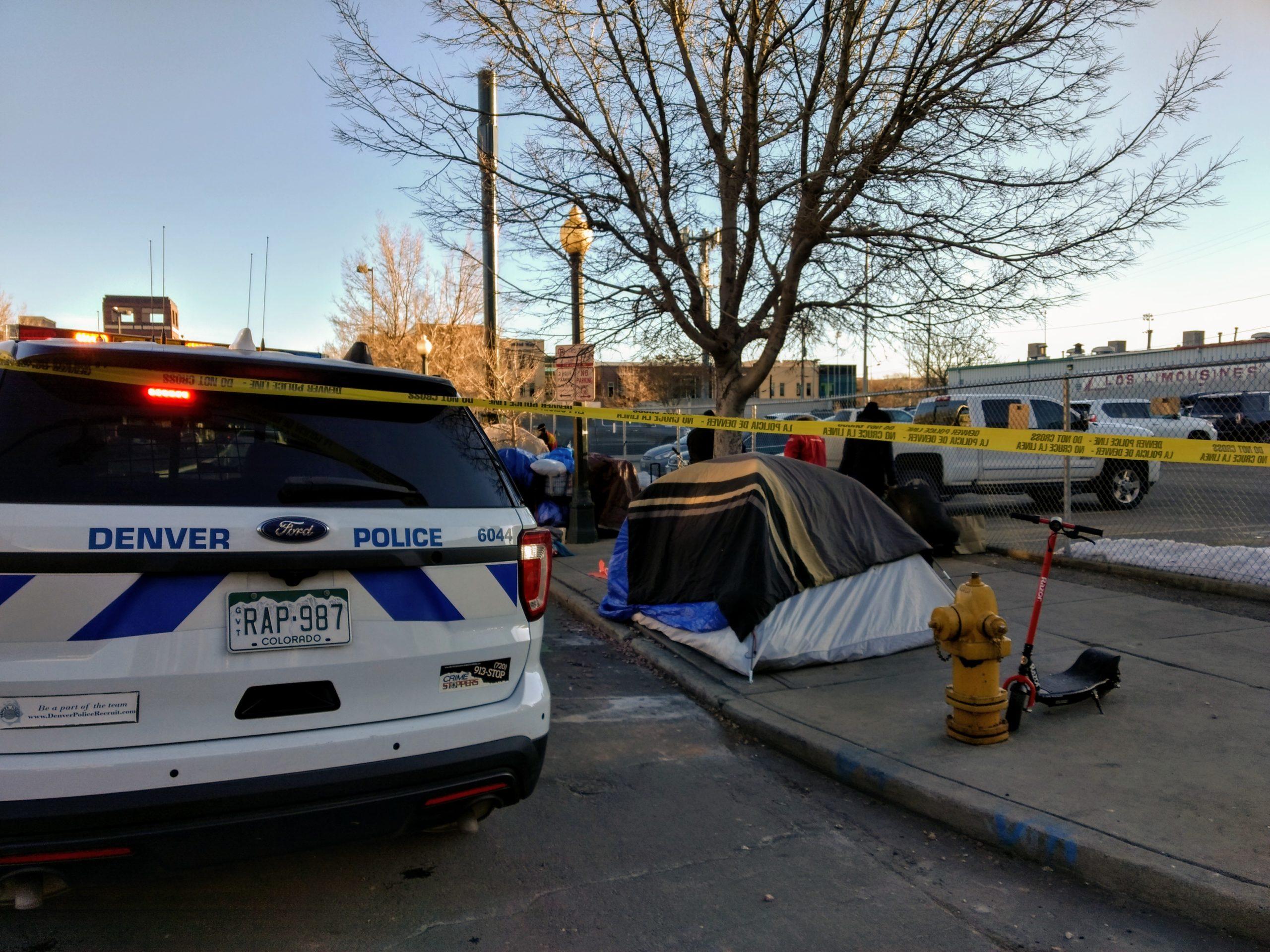While they didn't know much about a recent court ruling that Denver's urban camping ban is unconstitutional, Dennis Wamsley and Tyler Stevens say they know shelters, and that their experience of them bolsters the critique that led to the judicial decision.
Denver County Judge Johnny Barajas was convinced by evidence presented during four days of hearings held over two and a half weeks late last year. Barajas ruled that because Denver's shelters are inadequate, the ban violates constitutional protections against cruel and unusual punishment by outlawing on public property, as the camping ban does, such activities as eating, sleeping or storing belongings while sheltering with tents, tarps or blankets.
In the wake of Barajas's ruling released Dec. 27, Denver police announced they will no longer enforce the camping ban, pending clarification from the city attorney. The city has appealed the ruling, continuing to defend a measure that has survived several challenges since the Denver City Council enacted it in 2012.
Ryan Luby, spokesman for the City Attorney's Office, said Wednesday that consultations continued on whether the ban could be enforced pending the appeal.
"I don't have an answer on future steps just yet," Luby said.
Camping ban or no, another Denver ordinance bars people from sitting or lying downtown except for overnight.
And city officials are still asserting authority to ask people to move encampments to keep public areas clean. This week, Denver's Department of Transportation and Infrastructure -- which used to be the Department of Public Works -- did just that in the 2200 block of Stout Street and nearby in the 600 block of 24th Street in Five Points.
"Public Works has been conducting large-scale cleanups since 2016 due to the increasing presence of numerous encumbrances blocking the right-of-way and deteriorating conditions throughout the city," department spokeswoman Nancy Kuhn said in an email.
A settlement in a federal lawsuit unrelated to the challenge to the camping ban regulates such cleanups. The settlement finalized in September requires the city to give a week's warning in writing before clean-up crews move in and to ensure the return of property confiscated during clearances.
It's not clear whether suspending enforcement of the camping ban has increased the number of people living on Denver streets. But more tents seem to have appeared since word of Barajas's ruling has spread. Wamsley, though, had his tent folded into a shopping cart Tuesday as he surveyed others using tents from his vantage point along Broadway between Colfax and 14th avenues.
On Jan. 1, Wamsley said, a stranger stopped him on the street and said the camping ban had been lifted. But Wamsley was skeptical.
"The last couple of nights I've just been sleeping on a bench because it's just such a pain to set everything up and then have to take it down," he said. "We're cautious all the time. It makes the difference between losing all your belongings and going to jail."
Wamsley, who said it had been five years since he had a home, said it can be difficult to get to work because of shelters' limited hours and rules requiring people to line up at certain times in hopes of getting a bed for the night.
His friend Stevens said too few shelter spaces were available for couples.
His partner, Stevens said, "doesn't want to leave me. I don't want to leave her. So we sleep outside."
In his ruling, Barajas cited testimony that among those with "limited access to adequate shelter" are individuals with serious mental illness and unaccompanied young people.
Barajas added that workers on shifts needed a police escort to secure a bed "because of shelter curfews."
In his ruling, Barajas cited a decision by the U.S. Court of Appeals for the 9th Circuit in a case involving a Boise, Idaho camping ban: "As long as there is no option of sleeping indoors, the government cannot criminalize indigent, homeless people for sleeping outdoors, on public property, on the false premise they had a choice in the matter."
The U.S. Supreme Court recently refused to take up a petition from the city of Boise to consider that 9th Circuit ruling. The Supreme Court's refusal meant the Boise ruling remained the law for states in the 9th Circuit and made it hard to ignore in states such as Colorado, which is not in the 9th.
Denver's Judge Barajas dismissed the criminal case that led to the constitutional challenge, but included nothing in his ruling on what broader action the city should take regarding the camping ban.
The city had argued before Barajas that its shelters were adequate. Not addressed in the hearings were city plans to improve shelters, including ensuring they are open more than just overnight.
Jerry Burton, a homelessness activist who has lived on and off the streets of Denver for decades, was ticketed under the camping ban last year, leading to the criminal case over which Barajas presided. Burton is a member of Denver Homeless Out Loud, an advocacy group that tried and failed to persuade Denver voters to overturn the camping ban last year.

Proponents of the camping ban say it is needed in order to maintain order and sanitation for all who use the city's public spaces.
Homelessness organizations that provide shelter, health and other services were wary of 300, saying that while they opposed the camping ban, they feared Denver Homeless Out Loud's ballot measure could be read so broadly as to interfere with their efforts to help people in need.
Denver Homeless Out Loud also tried and failed repeatedly to get the state legislature to overturn the camping ban.
Denver police don't often issue tickets or make arrests under the camping ban, instead trying to persuade people to comply with the law. According to police statistics covering the period from the ban's enactment in 2012 through 2019, police have contacted nearly 24,000 people who appeared to violate the ban, but issued only 33 tickets and made only three arrests.
Burton had insisted on being ticketed so he could challenge the ban. Once the case got to court, Burton's lawyer raised several arguments, including that the camping ban was unconstitutional because it was enforced only against people experiencing homelessness and that it violated due process. Barajas acknowledged in his ruling that most of those ticketed and all of those arrested were people experiencing homelessness, but said that did not prove the ban was discriminatory.
Barajas rejected all but the cruel-and-unusual punishment argument and said Denver "has not had a custom, practice and policy of arresting, harassing and otherwise interfering with homeless people for engaging in basic activities of daily life and that Denver has implemented programs to end homelessness."
The city argued in the Burton case that in addition to contributing to the maintenance of order, safety and sanitation, the camping ban was an opportunity to connect people experiencing homelessness to services. Police must offer aid to people contacted under the camping ban under the law enacted by the city council.
Councilman Paul Kashmann, who chairs the council's homelessness committee, said Wednesday that just as the council enacted the camping ban, it could amend or overturn it in the wake of the judge's ruling.
But he said he has heard nothing from fellow council members to indicate any action is imminent.
Denver residents who voted in May to keep the camping ban could now be dismayed to see tents being erected along city streets.
"The only way we're going to get people out of tents is to get them the housing and services that they need," Kashmann said, adding that the city and service providers are taking steps to do so.
Wednesday along the 17th Avenue Parkway, P.J. Borchelt surveyed a patch of City Park he calls home. Police have occasionally asked him to leave in response to complaints from people living in apartments across 17th, he said. But he always returns.
Borchelt did not at first understand a change he has noticed since the court ruling.
"No one told us why," he said. "But, it was really weird: the rangers and the cops stopped chasing us away and started being nice."
A park ranger eventually explained what Judge Barajas had said and how police had responded.
Borchelt said it can be a struggle, but he manages to arrive from his campsite clean and presentable for jobs he's gotten through temporary agencies. He prefers camping to shelters, which he says can be infested with insects and have curfews that make it hard to get to work.
After five years on the streets, a nonprofit outreach worker told Borchelt in December that he would have a place in an apartment building next month. The home comes with counseling and other support and the rent will be kept low.
"The one prayer I've actually said all the time I've been homeless is, 'God, I need housing,"' Borchelt said. "It's the only from-the-heart prayer I've ever said out loud."













